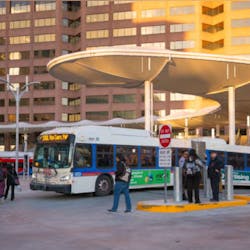Denver RTD outreach shows public favors temporary service reduction
Responses from the Denver Regional Transportation District's (RTD) recent Your Voice Matters survey reveals about three out of five people surveyed favor a potential temporary service reduction that was presented to the board of directors.
This change is being considered to address an ongoing operator shortage and to provide the public with a level of service the agency is confident it can deliver.
The results, captured by multiple methods between Nov. 4 -17, represent the viewpoints of thousands of Denver RTD riders, employees, elected officials, transit planners and others interested in agency business. The results were presented during a board study session at Denver RTD headquarters. Staff will be prepared to present a draft plan as early as Dec. 12. after receiving direction from the board.
If the board were to favor a temporary service reduction, it would not take effect before next spring. Any such plan would apply to Denver RTD’s bus and light-rail services. It would not apply to the University of Colorado A Line, the B Line or the G Line, commuter rail lines operated by concessionaire Denver Transit Partners. No specific details pertaining to a service reduction, including specific locations, lines or routes, have been determined.
“In embarking upon this effort, we were hopeful that the public, our employees and stakeholders would tell us what they think – and thousands of them did,” said RTD General Manager and CEO Dave Genova. “I can assure every person who submitted feedback that every word has been reviewed and will be treated with the utmost level of seriousness. My staff is confident that we are presenting the board with ample information as they consider making this impactful decision.”
Among the general public, approximately 13,000 people completed an eight-question survey, 5,000 called in to a telephone town hall meeting and nearly 100 stakeholders, such as elected officials, provided their thoughts. At 19 bus and rail stations across Denver RTD’s service district, staff invited 2,700 people to take the survey and engaged in extensive conversations with riders. Three hundred relevant comments provided on Denver RTD’s social media platforms during this time frame were gathered and sorted into feedback categories.
One of the questions included in the outreach was the length of time an individual would be willing to wait for a bus or train. While there was variability in this answer – ranging from one minute to two hours – the average answer was 18 minutes districtwide, half an hour by those participating in the telephone town hall and half an hour by stakeholders.
Within Denver RTD, all employees were given the opportunity to participate, and 170 operators responded through listening sessions, feedback forms and emails. Employee responses to the possibility of a service reduction were mixed. Some noted the high cost of living in the Denver region and said they rely upon the income resulting from a mandated six-day work week, which has been in place for many Denver RTD operators for several years. Others, speaking in favor of a reduction, said that their relationships, mental and physical health and overall quality of life had been affected by having such little time away from work.
Denver RTD is considering a temporary service reduction to provide the public with more reliable service on scheduled routes – and in response to factors being experienced across the Denver region and throughout the transit industry. Denver’s unemployment rate has reached a record high, and Denver RTD has been struggling to recruit and retain enough bus and light-rail operators. The shortage has been especially acute on light rail, with a 30 percent operator vacancy rate as of this week, leading many trips to be canceled.
Against this backdrop, the agency has been heartened to see that the newest class of light-rail operators includes 36 individuals, three times the average size of prior classes. Light-rail training begins about every six weeks and is 11 weeks in duration.
Over the past three years, Denver RTD has opened five new rail lines and one bus rapid transit line. In the past six years, the agency has added 20 percent more service, equating to approximately 600,000 hours. Even though Denver RTD is providing a high overall level of service across its system, the agency is canceling service even with mandates in place.
Were it to be approved by the board, a temporary service reduction would not completely alleviate the need to mandate employees, but it would reduce the need for the same employees to work six days every week. The agency says mandating is the single biggest factor affecting retention of new Denver RTD employees.
